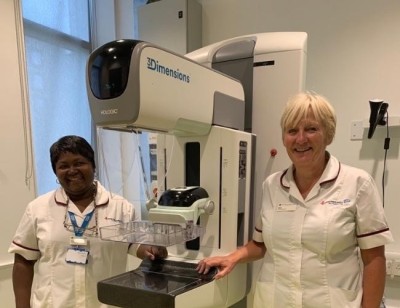
A multi-centre study (BRAID) of more than 9,000 women, including 700 recruited from the Royal Free London’s breast screening service, found using different scans from traditional mammograms could treble the number of cancers detected in this group of women.
Around one in 10 women have very dense breasts – very little fat and a lot of breast tissue – and they have a higher risk of developing breast cancer due to the increased amount of tissue. In addition cancer is harder to spot in dense breasts as the disease is masked by the tissue.
The trial tested different scanning methods on women with very dense breasts who had been given a mammogram and told they did not have cancer.
It is only through mammograms that women and their health professionals can identify breasts that are very dense but at the moment that information is not recorded.
The study, published in The Lancet, found two alternative methods, an enhanced mammogram and a fast MRI scan, detected 17-19 cancers per 1,000 women screened.
Both techniques use injections to make blood vessels more visible – tumours in the breast have a lot of blood vessels.
By contrast, traditional mammograms detect eight cancers in every 1,000 women screened. This amounts to more than 20,000 cancers currently detected each year.
Women aged 50 to 71 are invited for breast screening every three years and around two thirds take up the offer.
Based on the study results and that level of uptake, using the different scanning techniques on women with very dense breasts could identify 3,500 extra cancers per year and potentially save 700 lives.
William Teh, director of screening at the Royal Free London and the study site lead for the trust, said the results were important but it remained to be seen what changes would be implemented to the national screening programme.
He said: "At the moment we have a one size fits all screening programme so we need to adjust it so we can make sure more cancers are diagnosed early, giving more women a better chance of survival. But we still need to understand what approach will deliver the best results.”
The Department of Health and Social Care’s screening advisory body has been looking at ways to improve detection rates in women with very dense breasts for a number of years and said it would be reviewing the findings of the trial.
A new national cancer plan for England is expected to be published later this year.
 Translate
Translate